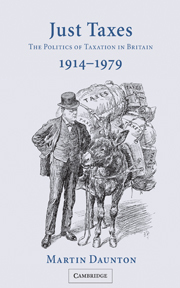Book contents
- Frontmatter
- Contents
- List of figures
- List of tables
- Preface
- List of abbreviations
- 1 The taxing state: an introduction
- 2 ‘The limits of our taxable capacity’: war finance, 1914–1918
- 3 ‘This hideous war memorial’: debt and taxation, 1918–1925
- 4 ‘Adjusting the particular turns of the different screws’: reforming the income tax, 1920–1929
- 5 ‘The great conflict of modern politics’: redistribution, depression and appeasement, 1929–1939
- 6 ‘The exigency of war’: taxation and the Second World War, 1939–1945
- 7 ‘The mortal blows of taxation’: Labour and reconstruction, 1945–1951
- 8 ‘A most injurious disincentive in our economic system’: Conservatives and taxation, 1951–1964
- 9 ‘Modern and dynamic economic policy’: Labour and taxation, 1951–1970
- 10 Rethinking taxation policy: from an opportunity state to an enterprise society, 1964–1979
- 11 ‘Highly defensible ramparts’: the politics of local taxation
- 12 Conclusion
- Appendix: chancellors of the Exchequer and prime ministers, 1908–1983
- Bibliography
- Index
2 - ‘The limits of our taxable capacity’: war finance, 1914–1918
Published online by Cambridge University Press: 23 December 2009
- Frontmatter
- Contents
- List of figures
- List of tables
- Preface
- List of abbreviations
- 1 The taxing state: an introduction
- 2 ‘The limits of our taxable capacity’: war finance, 1914–1918
- 3 ‘This hideous war memorial’: debt and taxation, 1918–1925
- 4 ‘Adjusting the particular turns of the different screws’: reforming the income tax, 1920–1929
- 5 ‘The great conflict of modern politics’: redistribution, depression and appeasement, 1929–1939
- 6 ‘The exigency of war’: taxation and the Second World War, 1939–1945
- 7 ‘The mortal blows of taxation’: Labour and reconstruction, 1945–1951
- 8 ‘A most injurious disincentive in our economic system’: Conservatives and taxation, 1951–1964
- 9 ‘Modern and dynamic economic policy’: Labour and taxation, 1951–1970
- 10 Rethinking taxation policy: from an opportunity state to an enterprise society, 1964–1979
- 11 ‘Highly defensible ramparts’: the politics of local taxation
- 12 Conclusion
- Appendix: chancellors of the Exchequer and prime ministers, 1908–1983
- Bibliography
- Index
Summary
The main question whether resort should be had to loans or to taxes … [is] to be considered with an eye partly to the present and partly to the future. Statesmen, if they are worth the name, will measure the internal as well as the external dangers to the society which they control. A prolonged war may result in social chaos, ruin, and revolution at home. Indeed, wars are frequently ended because the governments concerned relinquish their desire to fight on for conquest or prestige through fear that their own subjects, unable to endure more misery and want, will rise up in revolt against them. There is a limit to human endurance and to the economic misery which a state can inflict on its people.
F. W. Hirst, The Political Economy of War (London and Toronto, 1915), p. 150Hirst's dire prophecies were soon realised in Russia, where revolution broke out within two years of his warning. In most other combatant nations, the problems were greatest after the war when the burdens of debt, war pensions and reconstruction – and in the case of Germany, reparations – led to immense difficulties. In some ways, Britain was better prepared in 1914 to deal with the burdens of war than other European powers. The national debt had fallen over the previous century, and there was confidence in the security of loans.
- Type
- Chapter
- Information
- Just TaxesThe Politics of Taxation in Britain, 1914–1979, pp. 36 - 59Publisher: Cambridge University PressPrint publication year: 2002



